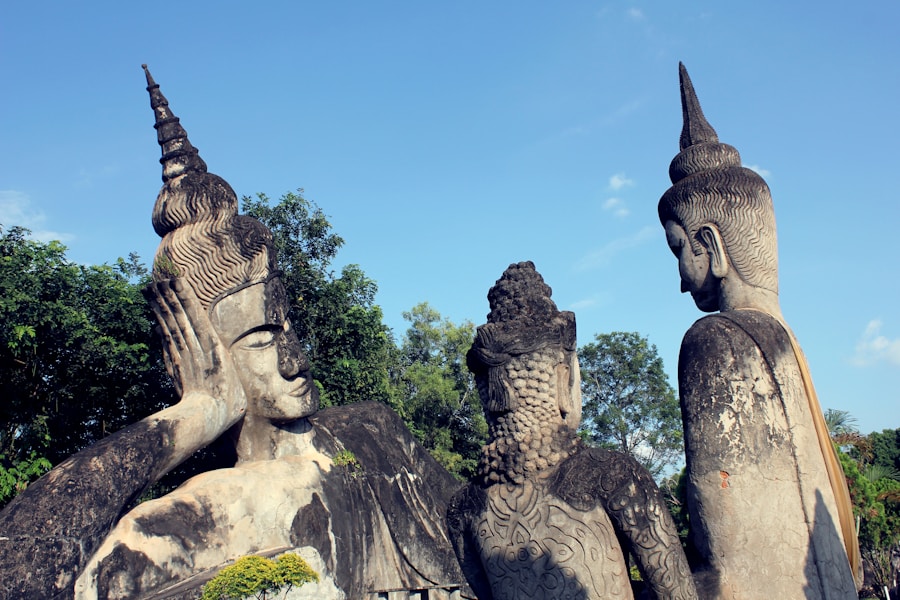ESCAPING THE NARCISSIST
Are you trapped in a toxic relationship? It's time to reclaim your life and find healing. ESCAPING THE NARCISSIST: HOW TO HEAL AND RECOVER FROM NARCISSISTIC ABUSE IN RELATIONSHIPS is your guide to breaking free and starting your journey towards recovery.
Don't let the pain control you any longer. Take the first step today and discover the strategies to overcome emotional abuse and rebuild your life. You deserve happiness and peace.
Start Your Healing Journey TodayKarma is a concept that originates from ancient Indian philosophy and has been widely embraced in Buddhist teachings. The word “karma” is derived from the Sanskrit language and translates to “action” or “deed.” In Buddhism, karma refers to the law of cause and effect, where every action, whether physical, verbal, or mental, has a corresponding consequence. The concept of karma is deeply intertwined with the teachings of Siddhartha Gautama, also known as the Buddha, who emphasized the importance of understanding the nature of karma in order to attain enlightenment.
Buddha’s teachings on karma revolve around the idea that individuals are responsible for their own actions and the consequences that follow. According to Buddhist philosophy, karma is not predetermined or fatalistic, but rather a result of one’s intentions and choices. The Buddha taught that by cultivating wholesome intentions and actions, individuals can create positive karma, leading to happiness and spiritual growth. Conversely, unwholesome intentions and actions lead to negative karma and suffering. Understanding the concept of karma is essential in Buddhism, as it provides a framework for ethical conduct and personal responsibility.
Understanding the Law of Cause and Effect
The law of cause and effect is a fundamental principle in Buddhist philosophy, and it forms the basis of the concept of karma. According to this law, every action, whether positive or negative, creates a ripple effect that influences future experiences and circumstances. In other words, the choices we make and the intentions behind our actions have far-reaching consequences that shape our lives and the world around us. This understanding of cause and effect is central to the practice of mindfulness and self-awareness in Buddhism.
In the context of karma, the law of cause and effect emphasizes the interconnectedness of all beings and the environment. Every thought, word, and deed has the potential to create a chain reaction that affects not only ourselves but also others. This awareness encourages individuals to act with compassion and wisdom, knowing that their actions have a profound impact on the world. By understanding the law of cause and effect, practitioners of Buddhism strive to cultivate positive intentions and actions that contribute to the well-being of all beings.
Embracing Karma as a Path to Enlightenment
In Buddhism, karma is viewed as a path to enlightenment, as it provides a framework for ethical conduct and spiritual growth. The concept of karma encourages individuals to take responsibility for their actions and to cultivate wholesome intentions that lead to positive outcomes. By embracing karma as a path to enlightenment, practitioners of Buddhism seek to break free from the cycle of suffering and attain liberation from ignorance and delusion.
The practice of embracing karma as a path to enlightenment involves cultivating mindfulness and self-awareness in everyday life. This means being conscious of one’s thoughts, words, and actions, and understanding their potential impact on oneself and others. By developing this awareness, individuals can make informed choices that align with their values and contribute to the greater good. Embracing karma as a path to enlightenment also involves letting go of attachment to outcomes and embracing detachment, as these qualities are essential for transcending the ego and attaining spiritual liberation.
The Power of Mindfulness in Shaping Karma
Mindfulness is a central practice in Buddhism that plays a crucial role in shaping karma. Mindfulness involves being fully present in the moment, observing one’s thoughts and emotions without judgment, and cultivating a deep awareness of one’s inner experience. By practicing mindfulness, individuals can gain insight into their habitual patterns of thinking and behavior, which allows them to make conscious choices that align with their values and intentions.
In the context of karma, mindfulness is essential for shaping positive outcomes through intentional action. By being mindful of one’s thoughts and emotions, individuals can avoid reacting impulsively or unconsciously, which often leads to negative consequences. Instead, mindfulness allows practitioners to respond skillfully to challenging situations, making choices that are rooted in wisdom and compassion. The power of mindfulness in shaping karma lies in its ability to break free from automatic patterns of reactivity and cultivate intentional actions that lead to positive outcomes.
Letting Go of Attachment and Embracing Detachment
In Buddhism, attachment is seen as a root cause of suffering, as it leads to clinging to transient experiences and identities. The concept of attachment is closely related to the idea of karma, as it influences the intentions behind one’s actions and shapes the consequences that follow. By letting go of attachment and embracing detachment, individuals can free themselves from the cycle of craving and aversion, leading to greater peace and contentment.
Detachment does not mean indifference or apathy; rather, it involves cultivating a sense of inner freedom from external circumstances. By embracing detachment, individuals can make choices that are not driven by personal desires or fears but are rooted in wisdom and compassion. This quality of detachment is essential for shaping positive karma, as it allows individuals to act with clarity and equanimity, regardless of the outcomes. Letting go of attachment and embracing detachment is a transformative practice that leads to greater resilience and inner peace.
Compassion and Kindness as Key Components of Karma
Compassion and kindness are key components of karma in Buddhism, as they form the foundation for creating positive outcomes through intentional action. The Buddha emphasized the importance of cultivating compassion for all beings, recognizing that every individual desires happiness and freedom from suffering. By practicing compassion and kindness, individuals can shape their karma in a way that contributes to the well-being of others, creating a ripple effect of positivity in the world.
In the context of karma, compassion involves recognizing the interconnectedness of all beings and acting with empathy and understanding. By extending kindness towards others, individuals can create positive karmic imprints that lead to harmonious relationships and collective well-being. Compassion and kindness are not only beneficial for others but also for oneself, as they lead to a sense of inner fulfillment and purpose. By making compassion and kindness integral components of one’s actions, individuals can shape their karma in a way that aligns with their highest values.
Embracing the Present Moment and Creating Positive Karma
Embracing the present moment is a central practice in Buddhism that has profound implications for shaping karma. By being fully present in the here and now, individuals can make conscious choices that lead to positive outcomes for themselves and others. The present moment is where intentions are formed and actions are taken, making it a crucial opportunity for creating positive karmic imprints.
In the context of karma, embracing the present moment involves cultivating mindfulness and self-awareness in everyday life. By being fully present in each moment, individuals can make choices that are aligned with their values and intentions, leading to positive outcomes. Embracing the present moment also involves letting go of regrets about the past or anxieties about the future, allowing individuals to focus on what they can do right now to create positive change. By embracing the present moment, individuals can shape their karma in a way that leads to greater happiness, fulfillment, and spiritual growth.
In conclusion, karma is a fundamental concept in Buddhism that emphasizes personal responsibility for one’s actions and their consequences. Understanding the law of cause and effect is essential for shaping positive outcomes through intentional action. Embracing karma as a path to enlightenment involves cultivating mindfulness, letting go of attachment, embracing detachment, practicing compassion and kindness, and embracing the present moment. By integrating these principles into everyday life, individuals can shape their karma in a way that leads to greater happiness, well-being, and spiritual growth.


